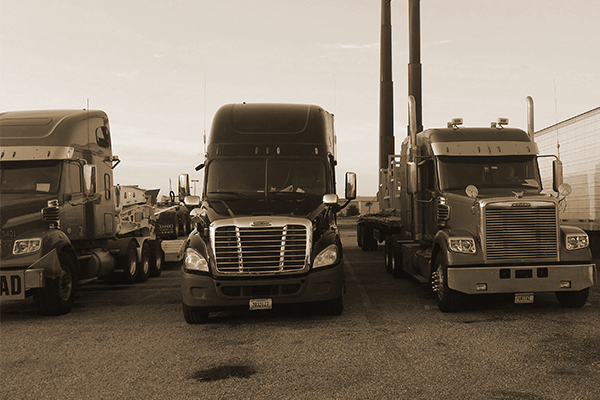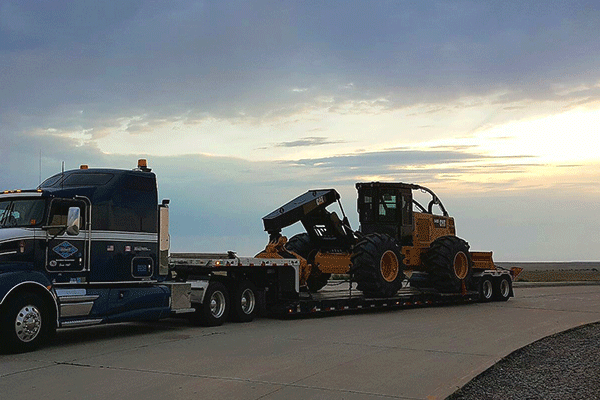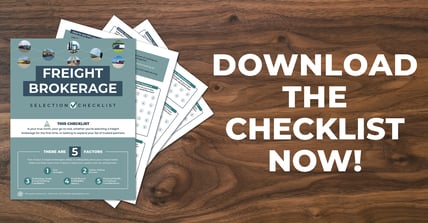Whenever your broker falls through and jeopardizes the smooth success of your supply chain, you wonder: What happened? And most importantly, how can I make sure this doesn’t happen again?
It’s natural to feel angry, confused, and frustrated when your broker falls short. After all, you went through the process of planning to get your shipment from point A to point B…only to have it all fall apart.
While there’s no perfect remedy to a broker that puts you in this horrible position, this blog will give you a better understanding of what you, as the shipper, can do to take care of yourself and weed out those “bad seed” freight brokerages from disrupting your plans.
Here at ATS, we’ve been working with shippers, carriers and receivers alike to move freight around the world for decades. During this time we’ve seen other brokers fall through, deadlines get missed and good companies suffer because of it.
In this blog we’ll outline:
- What causes brokers to fall through?
- How to hold your brokers accountable
- How to choose a reliable broker
These three sections will grant you the ability to wave sayonara to unreliable brokerages and select the correct partner the first time.
What Causes Brokers to Fall Through?
This industry is huge. With more than 17,000 licensed freight brokers operating across the U.S., there are simply too many of them to evaluate on your own. Because of this, as a shipper, you are all but guaranteed to have a bad experience with at least one of the brokers you partner with.
We cannot, however, pinpoint a single overarching reason that you’re left standing around waiting for your shipping partner to arrive.
In the trucking industry, there are several reasons that your logistics provider may fall through. Five of the most common of these are:
- Delays due to weather
- They underpriced your load
- They took a load they couldn’t cover
- Mechanical issues with a carrier’s truck
- Delays due to supply chain inefficiency

Delays Due to Weather
Sometimes, when Mother Nature voices her opinion, it becomes more dangerous for a carrier to collect your load than it would be to skip it. In these situations, when severe weather causes your carrier to fall through, the maintenance of your relationship faces a test.
A good carrier will do everything they can to work around inclement weather to ensure the transit of your freight at the quoted price within your time frame. But, since carriers often schedule their shipments into the future, they may need to significantly adjust their schedule to pick up your load.
This gets more difficult when unpredictable circumstances like severe weather disrupt timing. The adjustments made on the part of the carrier may or may not happen. This, for the most part, comes down to the quality of relationship that you maintain with your carrier.
They Underpriced Your Load
In this industry, money talks. The amount of money you allocate to the shipment of your freight directly correlates to the likelihood that it will be serviced. For this reason, you mustn’t select a carrier based solely on the quoted dollar amount.
When your brokerage secures you the lowest price possible for your freight, the carrier for your shipment might not stand by their commitment — being lured away from servicing your load for a higher rate with another brokerage for another customer. And, when a better offer comes along, you and the broker who underpriced your shipment may be left hanging.
For this reason, your brokerage must always price your load appropriately and submit a price that they know will properly motivate trucking companies to get your shipment moved.

They Took a Load They Couldn’t Cover
Some brokerages say that they can cover your load when in actuality they cannot. In these situations, your shipment may be left high and dry. This is frowned upon throughout the industry and typically happens when using smaller brokerages that lack the adequate amount of resources to follow through on their word. These resources may be:
- Adequate carrier network
- Adequate planning
- Experienced teams supporting your unique industry
Although this is not a comprehensive list, this should give you a better understanding of some of the factors associated with a broker’s ability to cover your freight.
Mechanical Issues With a Carrier’s Truck
Sometimes, due to mechanical issues with their carrier’s truck, a broker’s assigned truck isn’t able to pick up a shipment.
These common mechanical problems include but are not limited to: flat tires, engine malfunctions, brake deficiencies and fuel-gelling issues (in the colder months).
In these instances, a brokerage has no choice but to reschedule, repower or cancel a shipment altogether until the problems with the truck are resolved. Safety, above all else, comes first.

Delays Due to Supply Chain Inefficiency
Another issue that commonly arises, causing your truck to either show up late or fall through entirely, are delays on the part of previous parties serviced by your brokerage’s carrier.
In most cases, carriers plan their loads days into the future so that they have a better grasp of what to expect in the coming days. As such, a carrier’s timing is fully reliant on the efficiency with which they pick up loads. Sometimes, the truck on its way to service your shipment isn’t unloaded in a timely manner. This inefficiency can create logistical issues factoring into whether they will make it to your pickup sight on time.
In some instances — when your driver’s hours of service capacity is tight — this may result in a carrier having to drop your load from their calendar.
In these cases, good brokerages should work with their carrier network to find you another solution for your shipping needs.
How to Hold Your Broker Accountable
One-off shipments or any shipment that is not under contract make it particularly difficult to hold a transportation provider accountable. When they don’t show up for you, when they don’t demonstrate the respect you’ve shown them, you may feel stranded.
That said, there are still some tools at your disposal. Here are two actions you can take to rectify your situation and recoup your losses in the long term.

1.Consider working a financial penalty clause into the contracts you present to your trucking partner.
This clause will serve to clearly outline the expectations for pickup date and time and stipulate the penalties incurred should the trucking company back out of the deal.
These penalties typically consist of a monetary fine should a broker decide to back out of its commitment. Usually, shipper-broker agreements don’t include these types of clauses which leave shippers at the mercy of their logistics provider’s decision on whether to compensate for poor service.
Note, it is completely up to the brokerage to decide whether they enter into these types of contracts.
If you have a brokerage that consistently falls through and fails to operate with integrity in their handling of your shipment when things go wrong, this next step becomes necessary.
2. Kick them out.
Black-list them from your network and don’t look back. Although this may seem obvious, it is the most effective method for holding unreliable providers accountable for dodging your shipment.
They don’t get the benefit of doing business with you. There are plenty of reliable brokers and carriers for you to use and you’ll choose one of those.
To succeed in this industry, you must maintain a reliable network of transportation providers who you trust. To do so means that any provider who falls through, thereby leaving you scrambling for a last-minute solution, should be removed from your network.
Holding transportation brokers accountable in this way prevents this situation from happening again and again. Additionally, removing an unreliable broker from your network will help you in maintaining a reputation of reliability.
Always remember: you are who you do business with.
How to Choose a Reliable Broker
There aren’t many options available for shippers hoping to hold their brokers responsible for leaving them hanging. As such, shippers must take every step to ensure the smooth transportation of their goods before partnering with any brokerage.
This can be done in three main ways.
- Make sure they ask the right questions.
- Foster transparent communication with your transportation partner.
- Check-in on a broker’s track record.
Make Sure They Ask The Right Questions
Any time you're searching for a brokerage, it’s important that they ask you the right questions. Think of this initial interaction as a first date, the first step toward what you hope becomes a fruitful partnership.
As such, the types of questions they ask should give you the sense that they can, and will, provide you the best solution possible for your needs.
An ideal brokerage should ask you to clearly outline the specifics of your shipment.
Details like:
- What type of freight you need to be moved.
- The kinds of securement devices (straps, tarps, chains) it will need.
- The dimension of your freight (size, weight, height, etc.)
- What your timeframe is.
- What kind of price flexibility you have.
Asking these kinds of questions is a good indicator that a brokerage has the capabilities and experience you need to get the job done.
Sometimes, trucks will show up at a pickup location and won’t be equipped to handle the shipment they were sent to pick up. In these situations, the shipment may fall through because the brokerage didn’t have the correct information on the front end. A brokerage who asks their prospects the questions stated above is able to avoid these issues.
Foster Transparent Communication With Your Transportation Partner
Every step of the way, shippers should feel comfortable with the level of transparent communication between themselves and their shipping partner.
“When will my truck arrive,” “Where is my shipment located?” and “When will my freight be received?” are all questions that should be easily answered, and consistently updated, by your partner. By maintaining a clear line of communication, you can ensure that if something goes wrong and a delay to your shipment is necessary, your partner will handle it swiftly and competently to meet your needs.
As your relationship, founded on transparent communication, evolves with your transportation partner, you will find comfort and peace of mind trusting your freight to them in the future.
Nothing does this better than the establishment of solid, transparent communication between all stakeholders.
Check-in On the Broker’s Track Record
In today’s digital world, checking up on the track record and reliability of a broker has never been easier.
Find your potential partner’s DOT and MC number by doing a quick google search and check their history using the FMCSA’s website. This process will leave you with information regarding the amount of time a carrier has had active authority. This kind of competency check can mean the difference between your freight’s on-time departure from your loading dock and its costly delay.
Additionally, you can ask your broker for references from past and current customers. Doing this will give you a better understanding of the level of service your potential partner provides.
Finally, download the Freight Brokerage Selection Checklist to ensure that your next selection decision is the right one. It's time to do away with unworthy freight brokerage partners. Use this checklist to help you do just that.
Choose Your Freight Broker Wisely
Now that you have a better understanding of what causes brokers to fall through, how to hold them accountable when they do and how to select a reliable brokerage the first time, you’re better equipped to make this decision on your own.
Although this can be a daunting task, especially if you’ve been left out to dry by a previous broker, ATS is here to help. Check out our learning center for more tools to help you in your shipping journey.
If you’d like more information on how ATS can help with your shipping needs, request a quote or reach out with any top-of-mind questions you may have.




